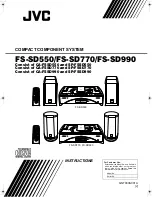
Other connections
15
En
Engl
ish
PREP
A
R
A
T
ION
2
■
Connecting an HDMI component
HDMI (High-Definition Multimedia Interface) is the first
industry-supported, uncompressed, all-digital A/V (audio/
video) interface.
By connecting to an HDMI component (such as a TV),
you can enjoy standard, enhanced or high-definition video
as well as multi-channel digital audio using a single cable.
When used in combination with HDCP (High-bandwidth
Digital Content Protection), HDMI provides a secure
audio/video interface that meets the security requirements
of content providers and system operators.
For further information on HDMI, visit the HDMI website
at “http://www.hdmi.org/”.
Viewing and Listening to playback
from an HDMI component
1
Connect HDMI terminal of the DVD receiver to the
HDMI input terminal of your HDMI compatible
component using a commercially available HDMI
cable.
2
Select the appropriate audio output from [HDMI
AUDIO OUT] in [AUDIO SETUP PAGE] (see
page 36).
3
Select the appropriate video output from [HDMI
VIDEO] in [VIDEO SETUP PAGE] (see page 39).
– The DVD receiver is not compatible with HDCP-
incompatible HDMI or DVI components.
– You need a commercially available HDMI/DVI
conversion cable when you connect the DVD
receiver to other DVI components.
– When connecting an HDMI component, refer to
the instruction manual for the component.
– Do not disconnect or connect the HDMI cable from
the DVD receiver or turn off the power of the
HDMI/DVI component connected to the HDMI
terminal of the DVD receiver while data is being
transferred. Doing so may disrupt playback or
cause noise.
Notes
L
R
AV MONITOR OUT
(DVD ONLY)
AM
ANT
GND
TUNER
HDMI
FM
ANT
75
Ω
UNBAL
HDMI
IN
TV
DVD receiver
















































